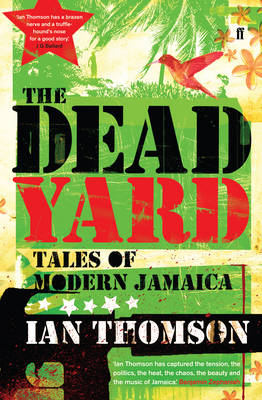
The Dead Yard
Seiten
2009
Faber & Faber (Verlag)
978-0-571-22761-7 (ISBN)
Faber & Faber (Verlag)
978-0-571-22761-7 (ISBN)
- Keine Verlagsinformationen verfügbar
- Artikel merken
Jamaica used to be the source of much of Britain's wealth, an island where slaves grew sugar and the money flowed out in vast quantities. Since independence in 1962, it has gradually become a society where extreme violence has become ordinary and gangs control the areas where most Jamaicans live. This book explores a country of lost promise.
Jamaica used to be the source of much of Britain's wealth, an island where slaves grew sugar and the money flowed out in vast quantities. It was a tropical paradise for the planters, a Babylonian exile for the Africans shipped to the Caribbean. Since independence in 1962, it has gradually become associated with a new kind of hell, a society where extreme violence has become ordinary and gangs control the areas where most Jamaicans live. Ian Thomson's brave new book explores a country of lost promise, a country that most older Jamaicans in Britain cannot recognise as their own.Once a beacon of optimistic third world politics, the island is now sunk in corruption, hopelessness and drug wars. Jamaica's music was once the lilting anthem of idealists everywhere; now it is a repetitive glorification of homophobia and violence. Thomson walks the streets and rides the buses that most middle class Jamaicans, let alone white visitors, avoid like the plague. He describes poverty, the reality of gang rule and police brutality. He meets Jamaicans who are trying to make a difference, and astonishingly complacent members of the elite.
This is an unforgettable portrait of a country that has had a huge influence on British culture, for good and ill.
Jamaica used to be the source of much of Britain's wealth, an island where slaves grew sugar and the money flowed out in vast quantities. It was a tropical paradise for the planters, a Babylonian exile for the Africans shipped to the Caribbean. Since independence in 1962, it has gradually become associated with a new kind of hell, a society where extreme violence has become ordinary and gangs control the areas where most Jamaicans live. Ian Thomson's brave new book explores a country of lost promise, a country that most older Jamaicans in Britain cannot recognise as their own.Once a beacon of optimistic third world politics, the island is now sunk in corruption, hopelessness and drug wars. Jamaica's music was once the lilting anthem of idealists everywhere; now it is a repetitive glorification of homophobia and violence. Thomson walks the streets and rides the buses that most middle class Jamaicans, let alone white visitors, avoid like the plague. He describes poverty, the reality of gang rule and police brutality. He meets Jamaicans who are trying to make a difference, and astonishingly complacent members of the elite.
This is an unforgettable portrait of a country that has had a huge influence on British culture, for good and ill.
Ian Thomson - 'a chronicler of formidable power' (Guardian) - is the author of Bonjour Blanc, an acclaimed book about Haiti, and of Primo Levi ('one of the best literary biographies of the year, Observer). He lives in London with his wife and children.
| Erscheint lt. Verlag | 7.5.2009 |
|---|---|
| Verlagsort | London |
| Sprache | englisch |
| Maße | 155 x 230 mm |
| Themenwelt | Reisen ► Reiseberichte ► Nord- / Mittelamerika |
| Geschichte ► Teilgebiete der Geschichte ► Kulturgeschichte | |
| Sozialwissenschaften ► Soziologie | |
| ISBN-10 | 0-571-22761-9 / 0571227619 |
| ISBN-13 | 978-0-571-22761-7 / 9780571227617 |
| Zustand | Neuware |
| Haben Sie eine Frage zum Produkt? |
Mehr entdecken
aus dem Bereich
aus dem Bereich
der stille Abschied vom bäuerlichen Leben in Deutschland
Buch | Hardcover (2023)
C.H.Beck (Verlag)
23,00 €
vom Mittelalter bis zur Gegenwart
Buch | Softcover (2024)
C.H.Beck (Verlag)
12,00 €


